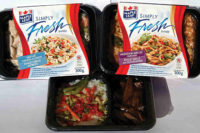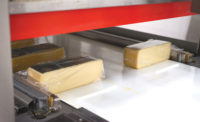Sustainability means different things to different people, according to Leigh Ann Johnston, director of sustainability. But, for Tyson Foods, there’s only one way to maintain sustainability.
“We define it as doing the right thing in all aspects of our business, so our company can stand strong for many years to come,” adds Johnston. “It’s a process of continual improvement that involves building responsibility and accountability into everything we do.”
Tyson Foods, Inc. is an international leader in the chicken, beef and pork markets, as well as prepared foods such as appetizers and snacks. Based in Springdale, Ark., it employs 115,000 people across more than 100 production facilities in 27 states. Internationally, Tyson Foods sells products in more than 130 countries and maintains direct, subsidiary and joint venture business operations in more than 20 countries.
“We’re focused on four key areas—people, planet, profit and products. This includes such important things as ethical business practices, food safety, worker health and safety, animal well-being and environmental protection and resource conservation,” Johnston says. “It also involves maintaining a strong bottom line to demonstrate financial performance and to support our sustainability-related efforts.”
That’s why Refrigerated & Frozen Foods honors Tyson Foods with its fourth annual Sustainable Supply Chain of the Year award. (Tyson Foods also placed No. 3 in the meat/poultry/seafood section of Refrigerated & Frozen Foods’ Top 150 Frozen Food Processors, March 2014 issue, and No. 1 in the prepared meat section of Refrigerated & Frozen Foods’ Top 25 Refrigerated Food Processors, January 2014 issue).
Here’s a look at Tyson Foods’ year-over-year achievements.
Fresh and frozen supply chain network
Tyson Foods’ distribution network supports both retail and foodservice channels, where products are distributed through the company’s 19 distribution centers and shipped together in an effort to maximize value and reduce carbon emissions.
To optimize freshness on the fresh foods side of the business, most shipments are made directly to the customer from one of the 100-plus production facilities. On the frozen side, Tyson Foods’ operates four distribution centers that serve as aggregation points for the products being distributed to both retail and foodservice channels.
“In both the fresh and frozen aspects of our business, we keep a focus on maximizing weight per load,” Johnston says. “This benefits our sustainability practices and bottom line. Our warehouses are located in the same general geographic regions as our production facilities, which promotes sound inventory management and efficient transportation.”
Fast FactsCompany: Tyson Foods, Inc. Headquarters: Springdale, Ark. Distribution: Worldwide Channels: Foodservice, distributors, retail No. of Plants: 100 across 27 states No. of Employees: 115,000 Produces: Fresh, frozen and refrigerated chicken, beef, pork, Cornish hens, snacks, appetizers, heat-and-eat entrées, deli items, soups, sauces, pizza crusts and sticks, tortillas and chips. Retail Brands: Tyson, TortillaLand, Nuevo Grille, Rotiland, Don Julio, Clover Club Product Produced Per Week: 40.9 million chickens, 135,000 pounds of beef, 391,000 pounds of pork, 41 million pounds of prepared foods |
Smart transportation is really the only “SmartWay”
Tyson Foods maintains a decade-long involvement with SmartWay, a partnership with the Environmental Protection Agency (EPA), Washington, D.C., to promote clean, efficient freight supply chain. Last year, Tyson Foods worked with the EPA to develop a training webinar designed to help carriers implement SmartWay standards.
In fiscal year 2013, EPA identified Tyson Foods as a top environmental performer and a semi-finalist in the SmartWay Excellence program, which recognizes high-performing partners that are leading the business community to a clean, efficient and more sustainable future for goods movement. For its part, Tyson Foods requires its products to be moved only by participating SmartWay carriers.
Call for 2015 NominationsIt’s never too early to begin thinking about next year’s Sustainable Supply Chain winner(s). So, throw your hat in the ring now. The Sustainable Supply Chain of the Year award recognizes a refrigerated or frozen food processor’s year-over-year efforts to reduce carbon footprint in transportation and warehousing activities, including front-end transportation savings, warehouse networks, transportation and packaging optimization, warehouse improvements and noteworthy supply chain efforts. Do you or someone you know fit the bill? Look for the nomination form online HERE or email editor-in-chief Marina Mayer at mayerm@bnpmedia.com. |
Tyson Foods also invested in ultra-light equipment, which allows the company to add product weight to the shipments.
“Over the last year, the ultra-light program has helped increase the weight we are able to put on shipments and eliminate the need for additional trucks on the road,” Johnston adds. “By doing this, we reduced more than 2 million truck miles during fiscal year 2013.”
Additionally, Tyson Foods further reduced its truck miles by using rail-to-ship food and other byproducts, which saved more than 55 million truck miles during fiscal year 2013.
In partnership with its customers, Tyson Foods continues to evaluate and implement opportunities to conserve truck miles by shipping directly to the customers’ docks.
“By altering order patterns and volumes to allow direct shipping, the company saved more than 2.4 million truck miles during fiscal year 2013,” says Johnston.
Tyson Foods also does business with some of the top ocean freight handling companies that have implemented practices and initiatives to lower CO2 emissions and fuel consumption. Examples are being able to sail at half speed, connecting to shore power, switching from low-sulfur fuel to marine-gas oil and on-dock rail, which eliminates the need to move containers from ships to rail terminals via trucks.
“These programs, along with the support and leadership of the company’s team members, were responsible for the elimination of more than 204 million over-the-road truck miles during the company’s fiscal years 2011-2013,” says Johnston.
One of Tyson Foods’ latest projects is replacing diesel-powered refrigeration units with electric storage unit trailers.
“The fuel saving projection for this project is estimated to be more than 90,000 gallons of fuel per year for one plant,” Johnston says.
Tyson Foods’ private fleet is constantly testing and researching new and improved ways to reduce emissions, lower fuel consumption and decrease greenhouse gases, while improving miles per gallon performance, says Johnston.
“In fiscal year 2013, we replaced older equipment with more than 200 new tractors that are SmartWay-certified and are equipped with battery and electric-powered auxiliary power units to reduce idling time, saving fuel and emissions,” she adds. “We also purchased more than 200 new trailers that are fitted with drag-reducing wind skirts that offer potential fuel savings.”
Water for the future
Last year, Tyson Foods formed a water council to help ensure a comprehensive approach to sustainable water use. In fact, Tyson Foods experienced an 11% reduction in water consumption company-wide since 2004.
“The council’s goal is to understand the current landscape for water management in the world, how it relates to our global operations and to create short- and long-term plans for water management and conservation across our company,” Johnston adds.
Mergers, acquisitions, new product developments
Earlier this year, Tyson Foods acquired the assets of Bosco’s Pizza Co., a Warren, Mich.-based producer of stuffed bread sticks and frozen pizzas for foodservice and retail customers. Bosco’s Pizza became part of Tyson Foods’ prepared foods division, but continues to operate under the Bosco’s Pizza Co. name.
In June 2013, Tyson Foods acquired Circle Foods, LLC, a San Diego, Calif.-based producer of refrigerated and frozen hand-held Mexican foods, uncooked tortillas and Indian flatbreads under the NUEVO GRILLE, TORTILLALAND and ROTILAND brands.
In February 2013, Tyson Foods’ subsidiary company, Tyson Mexican Original, Inc., acquired Don Julio Foods, a Clearfield, Utah, producer of flour and corn tortillas and salted snacks sold under the Don Julio and Clover Club brands.
Tyson Foods also added a new line of breakfast items to its product offerings with Tyson Day Starts, a line of protein-rich breakfast sandwiches made with high-quality ingredients like real cheeses, zesty vegetables, farm fresh eggs and proteins such as Tyson sausage, ham and chicken. Day Starts breakfast varieties include biscuit sandwiches, breakfast flatbreads and wrapped omelets, all ready to eat in less than two minutes. Plus, they offer up to 27 grams of protein per serving.
Furthermore, Tyson Foods experienced a 4% increase in sales from $33 billion in fiscal year 2012 to $34.3 billion in 2013. Tyson Foods also donated $2.4 million in cash to charitable organizations, donated 95 million pounds of protein to hunger relief agencies from May 2000 to December 2013 and spent $50 million on research and development, a 16.2% increase over fiscal year 2012.
“Sustainability touches all aspects of Tyson Foods’ operations and business activities,” says Johnston. “We do not limit the reach of sustainability to the common theme of just ‘being green.’ Rather, we believe it’s necessary to focus on a balance of people, planet, product and profit initiatives to seed long-term results aimed to benefit future generations. We make great food, and we make a difference.”
Moving forward
“We’re always looking for ways we can do things better, both from a business and sustainability perspective,” says Johnston.
In fact, Tyson Foods is aiming to become the leading “solutions-providing” food company—not just a company who provides commodity proteins. This means it continues to establish and maintain a culture of lean thinking, operational excellence and continuous improvement.
“Food is a trust business. Consumers put their trust in the brands they buy that what they feed their family will be safe to eat,” Johnston adds. “Tyson Foods has implemented policies, procedures and production practices that are designed with that in mind.”
And, that’s how Tyson Foods continues to make a difference one sustainable initiative at a time.
Refrigerated & Frozen Foods’ editor-in-chief Marina Mayer will present the 2014 Sustainable Supply Chain of the Year award at the 2014 Food Logistics Forum, June 1-3 in Lake Tahoe. For more information on this event, go to http://bit.ly/1eez84l.












